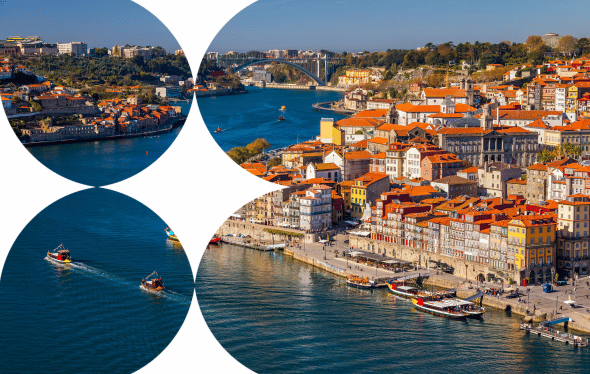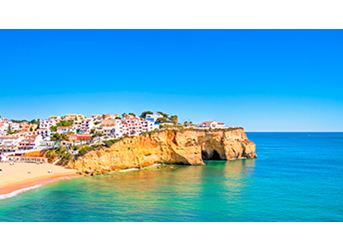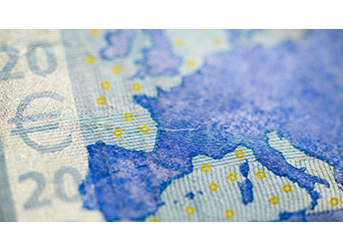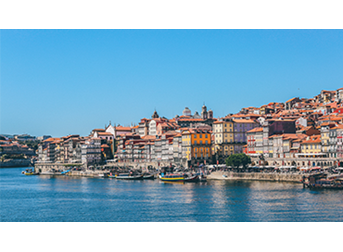How to move to Portugal
Make the most of your money for the move.



Guide on moving to Portugal
10 minute readWith its warm climate, relaxed lifestyle, mountainous regions and exciting business opportunities for aspiring entrepreneurs, Portugal offers the very best that Europe has to offer. Following the UK’s departure from the EU, British expats continue to flock to Portugal; the country is currently home to around 20,000 UK nationals, most of whom reside in the capital city of Lisbon.
That’s why we’ve created a guide on moving to Portugal from the UK, helping you make a smooth, stress-free transition to your new life abroad.
Do I need a visa to move to Portugal?
If you plan to stay in Portugal for more than 90 days, you will need to apply for a Temporary Stay Visa. This is valid for up to a year; if you would like to move to Portugal for stays longer than one year, or you wish to move there on a permanent basis, you will need to apply for a Residency Visa, also known as a long-stay visa.
Residency Visas are renewable, and there is a variety of Residency Visas to choose from. One of the most popular visas amongst British nationals is the Portugal D7 visa, also known as the Retirement Visa or Passive Income Visa, which is often used by freelancers, digital nomads and remote workers. Whilst this visa does not require that you make an investment, applicants must demonstrate that they have a minimum passive income of €705 per month, or €8,460 per annum. The D7 visa allows holders to relocate to Portugal; once they have made the move, they are required to apply for a residence permit with the Immigration and Border Services (SEF). After having lived in Portugal under D7 residence status for five years, foreign citizens can apply for a permanent residence permit.
To apply for a Portuguese residency visa, you will need to have either a regular passive monthly income that meets the stated thresholds or enough capital to invest in the country. If, on the other hand, you are retired and wish to emigrate to Portugal, you simply need to present evidence that you have sufficient financial means to support yourself in Portugal.
Do I have to pay tax on income or on transferring my overseas pension to Portugal?
Portuguese residents must pay tax on all the income that they earn within their country. This includes pension income and money that has been earned overseas.
The good news is that those moving from the UK to Portugal can apply for Non-Habitual Residence (NHR) status. This means that foreign residents need only pay a 10% flat tax rate on their foreign pension income, and highly qualified professionals employed in Portugal can enjoy an income tax rate of just 20%.
This helps contribute to the low cost of living that many expats enjoy in Portugal, and it is one of the many reasons why the country has proved such a popular choice for those looking to settle abroad.
How to open a bank account in Portugal
Whether you wish to buy a property in Portugal or are currently in the market for an apartment to rent, you will need to have a Portuguese bank account in order to make your payments. It’s fairly straightforward to open a bank account in Portugal: many banks allow you to do this from outside the country or online.
You will need the following documents in order to open a Portuguese bank account:
- A valid photo ID (passport)
- Proof of address, i.e. a utility bill
- Proof of employment
- Your Tax Identification Number (NIF)
What is the currency in Portugal?
The Euro (EUR) is the currency that has been used in Portugal since 2002, when it replaced the Portuguese escudo. The euro is the second most traded currency in the world, and it is the official currency of 19 out of the 27 EU member countries. Euros are made up of 100 cents, and note denominations include 5, 10, 20, 50 and 100 bills, in addition to the less common 200 and 500 notes.
If you move to Portugal from UK, you can get more value for your money when you make international payments by keeping a close eye on the pound to euro exchange rate. You also have the option of setting up a rate alert, which means that we will notify you via text or email if the rate moves above a set level of your choosing.
Emigrating to Portugal with pets
British citizens are required to follow EU rules and regulations when they bring their pets with them to Portugal. This means that you are required to have an ISO 11784/11785 standard microchip implanted into your pet by a licensed vet; you must also ensure that they receive vaccinations for rabies and a number of other diseases. You will need to wait at least 21 days after any primary rabies vaccinations before you travel. Your vet should be able to issue you with an EU Pet Passport, which you will need in order for your pet to be eligible to travel.
An EU Pet Passport contains all the relevant information for emigrating with your pet, including an ID number linked to the microchip and vaccination certificates. If the microchip is not ISO 11784/11785 compliant, you will need to bring the appropriate scanner with you to Portugal in order for the microchip to be scanned successfully.
Foreign currency exchange for moving to Portugal
Emigrating almost always requires that you make a number of international transfers between your British bank account and your new bank account abroad: you may, for example, need to complete the purchase of a property or transfer your savings or pension to your new foreign account.
Many high-street banks charge transaction fees of up to £30 on international transfers, which only increases the cost of sending money to Portugal. With our team of foreign exchange specialists, on the other hand, you can rely on low transfer fees, a competitive GBP to EUR exchange rate and a dedicated service that helps you to get the best value for money.
What to expect from living in Portugal
Portugal is renowned for its relaxed pace of life. This suits those who like to take things slowly, but this can also act as a source of frustration: restaurants and shops are often closed for several hours in the middle of the day and on Sundays. Portugal is rightly proud of its culinary heritage; fish, meat, and garlic are hallmarks of Portuguese cuisine, and there is a vast range of desserts, pastries and cakes to enjoy.
The Portuguese climate is characterised by very hot summers (the temperature can sometimes rise to 40°C) and rainy winters; if you’re fond of snow over the winter season, you may find that it takes rather a while to get used to the weather. You will need to buy heaters during the colder periods of the year, as most buildings are not centrally heated.
Whilst most Portuguese people speak English, it does help to know a little Portuguese, as this is the language that is generally spoken in government agencies.
What is the cost of moving to and living in Portugal?
Moving to Portugal is not prohibitively expensive: given its relative closeness to the UK, shipping costs are fairly low (one estimate puts the cost at £2,500). Bear in mind that duty and tax is payable on all items which are new or less than 6 months old that you bring with you to the country.
For would-be investors, Portugal is a very attractive option: expats can qualify for residency through Portugal’s Golden Visa program by investing €280,000 in Portuguese real estate, which is one of the lowest investment thresholds in Europe. According to Global Residence and Citizenship Programs report, Portugal’s Golden Visa Programme is the best residence by investment program in the world.
One of the reasons why Portugal is so popular amongst expats is its affordable cost of living. Indeed, it arguably offers the lowest cost of living in Western Europe (living costs are thought to be 30% lower, on average, than in any other country in the region). Rents for a one-bedroom apartment in small Portuguese cities are sometimes as low as €400 a month, with housing costing, on average, €1,100 in rent per month.
Healthcare and insurance in Portugal
Portugal’s healthcare system is state-funded, and it is known as the Serviço Nacional de Saúde, or SNS. Those who are resident in Portugal, i.e. those with resident permits, have the right to register for state healthcare; expats who are staying short-term, however, do not qualify for public health insurance, and they are well advised to seek private health insurance during their stay. Private insurance costs €400 on average.
British expats are required to register at their local healthcare centre, or centro de saúde. You need to display their passport and residence permit, and you will then be given a health number; this will act as your ID number, and it will allow you to access state healthcare services in Portugal. If you receive a state pension from the UK, you are required to register for healthcare with an S1 form.
While healthcare in Portugal is universal, it is not free; there is a fee associated with various services. There are also several health services, such as dental care and cosmetic surgery, that are not covered by the SNS. For these reasons, a fifth of Portuguese citizens carry a private health insurance plan to supplement their public health care.
What are the income taxes in Portugal?
Residents in Portugal are taxed on their worldwide income at progressive rates, starting at 14.5% at the lowest end (this applies up to the first €7,116) to a top rate of 48% (this applies to earnings over €75,010). Portuguese income taxes apply to earnings in the following categories:
- Employment income
- Earnings from self-employment
- Profits earned from investments
- Rental income from Portuguese properties
- Capital gains from selling properties, assets and shares
- Pensions in Portugal (this includes private pension plans)
Thanks to the Non-Habitual Residency (NHR) tax codes, expats can enjoy an enviable income tax on Portuguese earnings at a flat rate of just 20%, as opposed to the standard progressive rates of up to 48%.
Tips on making the most for your money when you emigrate
Our News Hub offers plenty of easy-to-read guidance on how to emigrate abroad.




